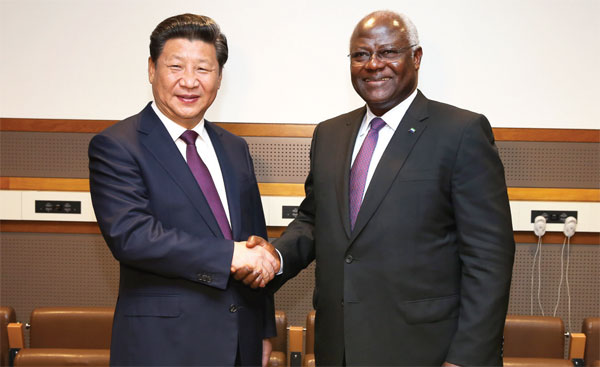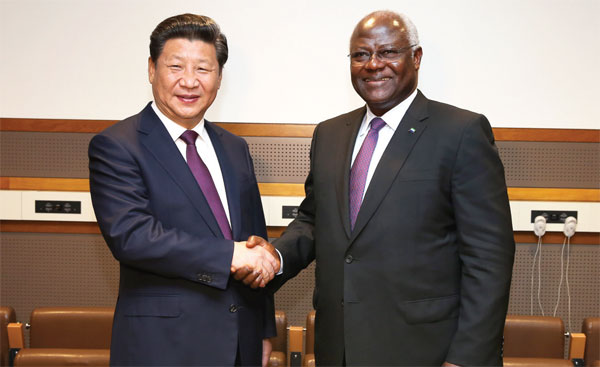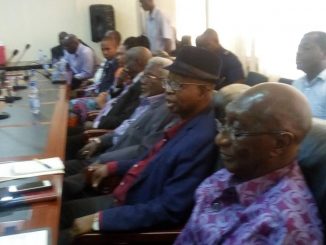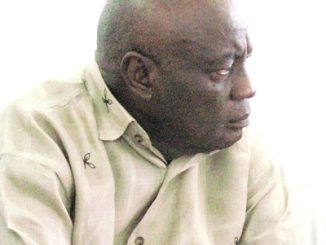
Xi: China to help Sierra Leone, Nigeria
By Wu Jiao and Hezi Jiang at the United Nations (China Daily USA)Updated: 2015-09-28 13:21
Chinese President Xi Jinping met with the presidents of Sierra Leone and Nigeria on Sunday at the United Nations, and said China would strengthen cooperation with both countries in several areas, including trade, investment and infrastructure construction.
In his meeting with Sierra Leone President Ernest Bai Koroma, Xi said China is working on a plan to help rebuild the economies of Sierra Leone and the two other West African countries hit by the Ebola virus epidemic, Liberia and Guinea.
“A friend in need is a friend indeed. That defines the friendship of China and Sierra Leone,” said Xi.

Xi Jinping and Ernest Koroma |
China and Sierra Leone established diplomatic relations 44 years ago, and both presidents agreed that the two countries have built a stronger bond through fighting the Ebola epidemic.
When the Ebola virus broke out, China provided over $121 million in aid for the three West African countries. For the first time, China sent systemic medical corps overseas, and set up a mobile bio-laboratory and an infectious disease medical center in Sierra Leone.
Koroma thanked China for its help in fighting the epidemic, and said Sierra Leone will always maintain and develop its relationship with China by cooperating on development, health and infrastructure, and establishing closer communications on multilateral issues.
Xi said China will help Sierra Leone to enhance and protect the health of its people by supporting the establishment of a disease prevention and control system and research center, and expand the Chinese medical help in Sierra Leone. China also is working with Sierra Leone on setting up an industrial system, expanding technical training, and speeding up infrastructure construction.
Xi said China is interested in expanding fishery cooperation with Sierra Leone and helping the country to establish a food-safety inspection system, as well as develop rice planting, crop storing, fishing and fish processing.
China also agreed to cooperate with Sierra Leone on issues including Post 2015 Sustainable Development Goals, climate change, UN Security Council reform, and international and regional hot topics.
In his meeting with Nigerian President Muhammadu Buhari, Xi noted that next year marks the 45th anniversary of the establishment of diplomatic ties between the two countries. He said China is willing to strengthen cooperation and exchanges with Nigeria in a wide range of areas, including politics, trade, investment, finance, agriculture, education, security, international issues.
The two countries established diplomatic relations in 1971, and the relationship has expanded through increased trade and strategic cooperation. In the last 10 years, China’s economic involvement with Africa has increased exponentially. China is working on developing special economic zones(SEZs) in sub-Saharan Africa, including two SEZs in Nigeria. Chinese are also building new roads, railways and airports across Nigeria.
Buhari expressed appreciation for China for its long support of and assistance to Nigeria in national security and economic development.
He said the bilateral cooperation has made progress in various areas, with infrastructure, agriculture and hydropower development emerging as highlights of that progress, and that the Nigerian government will continue to promote all-round development of bilateral relations with China.
The sixth ministerial meeting of Forum on China-Africa Cooperation will be held in December in South Africa. Xi invited Koroma to attend and play an active role at the meeting. This year also marks the 15th anniversary of the founding of the Forum on China-Africa Cooperation, and Xi told Buhari that China agrees with the African side on the proposal to upgrade the December meeting to a summit.
On the same day that Xi and Koroma met, Sierra Leone began a second 42-day countdown to being Ebola-free as its last two known Ebola patients left a hospital and the country lifted quarantine restrictions in the north, Agence France-Presse reported. The World Health Organization (WHO) says a country can be declared Ebola-free 42 days after the last confirmed case has tested negative twice for the virus, once after each 21-day maximum incubation period.
Since first emerging in December 2013, the worst outbreak of Ebola in history has infected nearly 28,000 people and left some 11,300 dead, almost all in Sierra Leone, Liberia and Guinea, according to the WHO.



